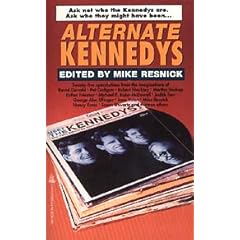The state of TIAH
March 14th, 2007
Digg this
Alternate Historian's Note: Our Guest Historian, Stephen Payne, suggested that it was time for a contest, so we're going to have an April Fool's Day Contest! Email us up to 3 entries for an alternate April 1st and we will post the best 10, with your own credit and link to your website (if you have one). My lovely Co-Historian says that if we can get 30 entrants, we can offer an ultimate winner a complimentary TIAH mug, but we only have 1 entrant so far! Get researching those alternate histories now, folks! The deadline is March 29th.
in 1792, per the advice of founder Thomas Jefferson, the U.S. Congress amends the country's constitution regarding patent law. “In order to foster innovation,” Jefferson says at the passage of the amendment, “the United States shall recognize a patent and copyright period not to exceed 5 years for a corporation, and 20 years for an individual's creation.” America becomes known for its lax laws regarding intellectual property, and creativity and innovation are indeed spurred by the nation's unwillingness to “lock up ideas,” as patent-holding President Abraham Lincoln referred to the country's system. In spite of corporate efforts to extend their own patent/copyright periods, America has resisted changing a system that has given the world both innovative machinery and powerful literature.
in 1953, Soviet leader Georgy Malenkov has his arch-rival, Nikita Khrushchev, poisoned. Khrushchev was on the brink of toppling Malenkov from his position in the Communist Party, and Malenkov moved first. Although he faced some trouble from Khrushchev's allies in the party at first, a quick purge removed them from power. Malenkov became even more repressive than his predecessor Stalin, and relations with the west soured under his leadership. Relations with the non-aligned nations didn't fare much better, and in 1959, he was ousted and exiled in an attempt to liberalize the Soviet Union. Leonid Brezhnev assumed the leadership of the USSR, and to show the world that times had changed, called a general election the next year, which he won handily. Although Brezhnev held on to power with a steely grip, he did open the country's re-education camps and release political prisoners. He was hailed by the west for opening the Soviet Union to business ventures from various friendly capitalists, and allowing the Soviet people to elect its leaders (apart from himself). He even set in place the electoral procedures following his death, so that the USSR could finally become a democracy.
 Jack Ruby | In 1964 a jury in Dallas, Texas found Jack Ruby guilty of killing John F. Kennedy. Ruby's motives have been debated. Some believe that Ruby carried out Mafia orders with a 'hit,' because he was actually part of a conspiracy to assassinate the president. Ruby himself said that the shooting occurred on the spur of the moment .. |
| .. when the opportunity presented itself, without considering any reason for doing so. | |
~ entry by Steve Payne from counter history in context - you're the judge! | |
| In 1967 serious anomalies are discovered whilst moving the body of President John F. Kennedy to a permanent burial place at Arlington National Cemetery. The true story of how the wounded President had been smuggled out of Dallas to be secreted at Hyannisport was later revealed by Nicholas A. DiChario in his masterful work 'The Winterberry'. |  Alternate Kenne.. |
~ entry by Steve Payne from Counter History in Context - You're the Judge! | |
 Construction of.. | In 1903 the Hay-Herran Treaty was ratified by the Senate, granting the United States the right to build the Panama Canal. The Colombian Senate would later reject the treaty. By then, Americans had learnt of the Extraterrestrial Technology (ET) buried in Panama, which they fully recovered in the invasion of 1989 on the .. |
| .. pretext of unseating General Noriega. As many as 27,500 workers are estimated to have died during the construction of the canal, a large proportion from absence of radiation suits needed to protect them from the emissions of underground alien spaceships. | |
~ entry by Steve Payne from counter history in context - you're the judge! | |
| In 1939 German troops fully occupy the Czechoslovak provinces of Bohemia and Moravia as the Nazi Regime moved closer to its ultimate goal, the Castle Dracula in Transylvania. |  Dracula's Castle |
~ entry by Steve Payne from Counter History in Context - You're the Judge! | |
Cool stuff - Let us know where you are on Frappr! and We've been Dugg
We have links again! Yay, us. Check them out on the side of the page, and if you have some suggestions, send them to us!
Visit the Co-Historian's store -







 Saddam Hussein and his weapons are a direct threat to this country, to our people, and to all free people... I believe Saddam Hussein is a threat to the American people. I believe he's a threat to the neighborhood in which he lives. And I've got good evidence to believe that. He has weapons of mass destruction... The American people know that Saddam Hussein has weapons of mass destruction.
Saddam Hussein and his weapons are a direct threat to this country, to our people, and to all free people... I believe Saddam Hussein is a threat to the American people. I believe he's a threat to the neighborhood in which he lives. And I've got good evidence to believe that. He has weapons of mass destruction... The American people know that Saddam Hussein has weapons of mass destruction.  ~ US President George Bush speaking on 3rd March 2003.
~ US President George Bush speaking on 3rd March 2003.